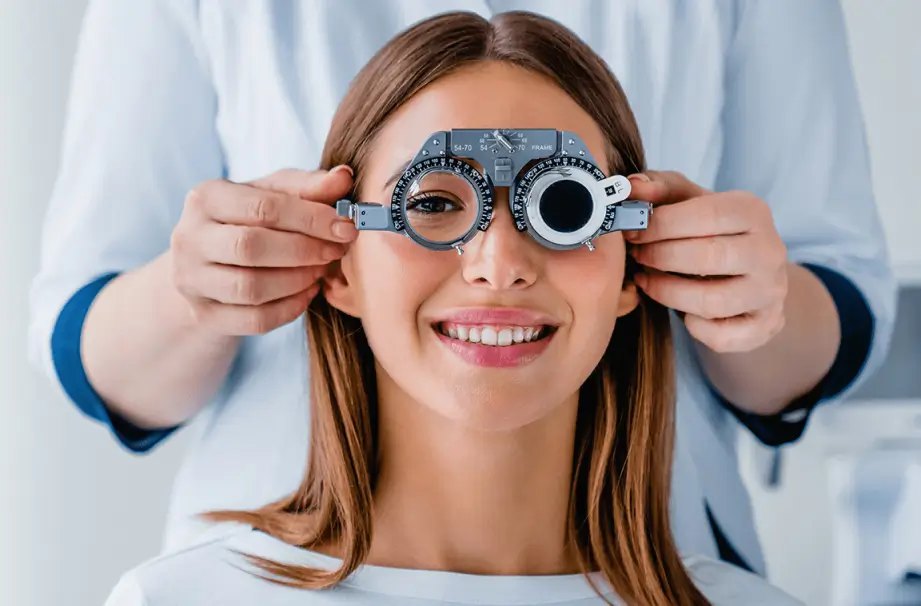Good vision plays a crucial role in daily life, yet millions of people experience refractive errors like nearsightedness and farsightedness. These conditions affect how the eyes focus light, leading to blurry vision at certain distances. If left uncorrected, they can cause discomfort, headaches, and strain. A trusted optometry clinic provides the right solutions to manage these vision issues effectively. If you plan to buy an optometry clinic, offering specialized treatments for these conditions can significantly enhance patient care and business growth.
What are Nearsightedness and Farsightedness?
Refractive errors occur when light entering the eye does not focus correctly on the retina. Two common conditions affecting vision are nearsightedness (myopia) and farsightedness (hyperopia).
What is Nearsightedness (Myopia)?
Nearsightedness makes it difficult to see distant objects clearly while nearby objects remain sharp. It happens when the eyeball is too long or the cornea is too curved. As a result, light rays focus in front of the retina instead of directly on it.
Symptoms of Myopia
- Blurry vision when looking at far objects
- Frequent squinting
- Eye strain and headaches
- Difficulty seeing road signs while driving
What is Farsightedness (Hyperopia)?
Farsightedness causes nearby objects to appear blurry, while distant objects may be clear. This occurs when the eyeball is too short or the cornea has too little curvature, causing light to focus behind the retina.
Symptoms of Hyperopia
- Blurred vision while reading or using digital devices
- Eye fatigue and strain
- Difficulty concentrating on close-up tasks
- Headaches after prolonged near work
How an Optometry Clinic Can Help?
A well-equipped optometry clinic offers several treatments and vision correction options to address nearsightedness and farsightedness. Each patient receives a personalized approach based on their eye health, lifestyle, and vision needs.
Comprehensive Eye Exams
The first step in managing refractive errors is a detailed eye examination. A licensed optometrist evaluates vision using advanced diagnostic tools to measure how light focuses in the eyes. Regular exams help detect issues early and prevent worsening vision problems.
Tests Included in an Eye Exam:
- Visual Acuity Test: Determines how a person sees at various distances.
- Refraction Test: Identifies the exact prescription needed for glasses or contact lenses.
- Retinal Examination: Evaluates the health of the retina and optic nerve.
- Corneal Curvature Test: Assesses the shape of the cornea to detect irregularities.
Prescription Glasses and Contact Lenses
Corrective lenses remain the most common solution for myopia and hyperopia. An optometry clinic provides customized glasses and contact lenses based on a patient’s prescription.
- Single-vision lenses: Correct either nearsightedness or farsightedness.
- Bifocal lenses: Help those with both conditions by offering two focal points in a single lens.
- Progressive lenses: Provide a smooth transition between different focal points without visible lines.
- Contact lenses: Available in soft, rigid gas-permeable, or hybrid materials for different needs.
Orthokeratology (Ortho-K) for Myopia Control
Orthokeratology, or Ortho-K, is a non-surgical option that involves wearing specialized rigid contact lenses overnight. These lenses temporarily reshape the cornea, allowing clearer vision during the day without glasses or contacts. Ortho-K is particularly effective for slowing myopia progression in children and young adults.
Refractive Surgery Options
For those looking for long-term solutions, an optometry clinic can assess eligibility for refractive surgeries that reshape the cornea to improve vision. Some common procedures include:
- LASIK (Laser-Assisted in Situ Keratomileusis): A laser removes a small amount of corneal tissue to correct refractive errors.
- PRK (Photorefractive Keratectomy): Similar to LASIK but involves removing the outer layer of the cornea before reshaping.
- Implantable Lenses: Artificial lenses placed inside the eye for severe cases of myopia or hyperopia.
Vision Therapy for Eye Strain and Focus Issues
In some cases, vision therapy can help strengthen eye muscles and improve focusing ability. A structured program of exercises and activities is designed to enhance eye coordination and reduce strain.
Preventive Measures to Maintain Healthy Vision
An optometry clinic not only treats vision problems but also guides maintaining eye health. Preventive care includes:
- Encourage patients to follow the 20-20-20 rule: Every 20 minutes, look at something 20 feet away for 20 seconds.
- Recommending UV protection: Sunglasses with 100% UV blocking prevent corneal damage and reduce the risk of cataracts.
- Promoting good screen habits: Limiting excessive screen time reduces digital eye strain.
- Educating on proper contact lens hygiene: Prevents infections and complications from improper use.
Importance of Early Diagnosis and Regular Eye Checkups
Many people ignore mild vision issues until they become severe. Regular eye checkups help detect vision changes early, preventing long-term complications. Early intervention in children can ensure proper learning and development, while for adults, routine exams help manage vision changes due to aging.
Why Choose Eyeology?
Eyeology stands out as a trusted provider of advanced vision care. Our clinic is dedicated to delivering personalized solutions for nearsightedness, farsightedness, and other refractive errors.
- Experienced optometrists: Our team stays up to date with the latest advancements in vision correction.
- State-of-the-Art Technology: We use cutting-edge diagnostic tools and treatments.
- Comprehensive care: From eye exams to corrective lenses and surgery consultations, we offer a full range of services.
- Patient-focused approach: We prioritize comfort, education, and long-term eye health for every patient.
Proper vision care enhances daily life and overall well-being. Whether a patient needs glasses, contact lenses, or advanced treatment options, an optometry clinic plays a vital role in providing effective solutions.

